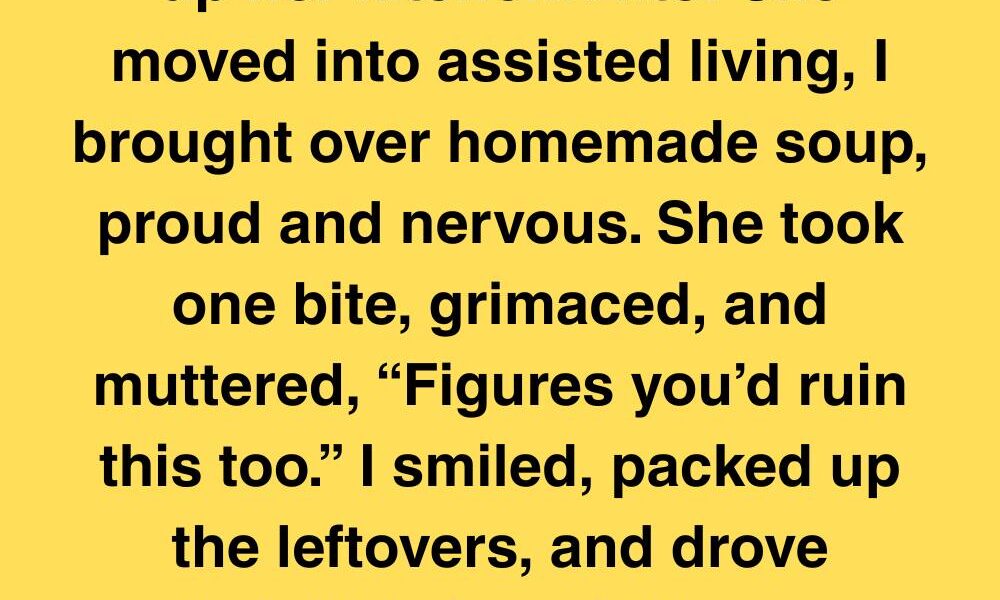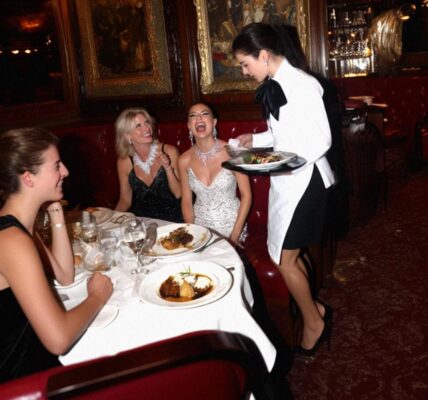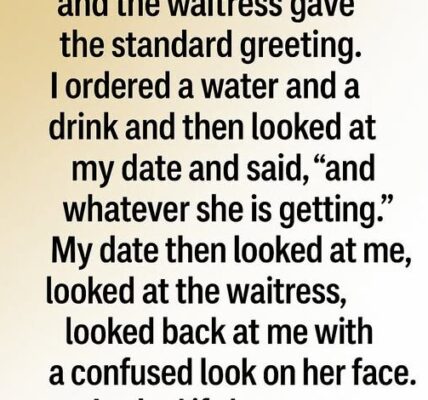Mom Never Let Me Cook Growing Up—But Her Recipe Box Hid Something I Wasn’t Supposed To See
Mom never let me cook growing up—said I’d just mess up her kitchen. After she moved into assisted living, I brought over homemade soup, proud and nervous. She took one bite, grimaced, and muttered, “Figures you’d ruin this too.” I smiled, packed up the leftovers, and drove straight to her old house, where I had already started cleaning out her pantry.
She hadn’t lived there for three weeks, but the kitchen still smelled like her—onions sautéed in butter, vinegar, and dust. I stood by the sink, holding back tears. I wasn’t sad about the soup. I was sad because I was finally ready to do the one thing I was never allowed to, and she still found a way to shut me down.
I opened the cabinets like they were full of secrets. In a way, they were.
Mom’s recipe box sat on the top shelf above the stove, buried behind some old wine glasses. I’d never seen her open it, not once, not even on holidays. She always cooked from memory—at least that’s what she said. But I figured it would have instructions, some yellowed index cards with stains, maybe a clue about how she got her cornbread so perfectly crispy on the edges.
The box was heavier than I expected. The lid creaked when I lifted it.
The first few cards were what you’d expect. Chicken and dumplings. Sweet potato casserole. “Mona’s Meatloaf (DON’T OVERBAKE!!)” scribbled in her tight, slanted handwriting. But then I found a folded envelope wedged between “Shrimp Étouffée” and “Aunt Tilda’s Banana Pudding.”
It had my name on it.
Not “Honey” or “Sweet Pea,” the nicknames she always used. Just my full name in blocky, deliberate letters: NORA EVANGELINE HART.
I hesitated. My hands shook a little.
Inside was a single sheet of lined paper. No greeting. No signature. Just four sentences, written like commands:
“If you’re reading this, I’m probably not around. Look in the green tin under the stove. Take it to Dora. Don’t tell your brother.”
That’s it. No explanation. No “Love, Mom.” Just those instructions.
Now, if you knew my mom, you’d know this is exactly her brand of dramatic. But it wasn’t like her to write things down. And she hated Dora—at least, that’s what she’d always said.
Dora had been Mom’s best friend turned enemy. They were inseparable until something happened in 1989 that they both refused to talk about. After that, Dora moved four towns over and Mom started calling her “that two-faced witch.” We weren’t allowed to say her name in the house.
So why was I supposed to take her something?
I pulled out every pan and cookie sheet under the stove until I found a dented green tin pushed far in the back. It rattled when I picked it up. I took a deep breath and cracked it open.
Inside were twenty-four gold coins. Real ones, from what I could tell—old, heavy, and stamped with some Latin inscriptions. There was also a crumpled napkin with a name and phone number written in lipstick: Dora Linwood – 617-448-3007.
I Googled the coins. They were legit. Krugerrands. South African. Each one worth around two thousand bucks.
I had nearly fifty grand sitting in my lap.
That’s when my brother, Jerro, barged through the back door.
“Soup not a hit?” he said, nodding toward the untouched container on the counter.
I scrambled to close the tin, but he saw the glint.
“What’s that?” His voice got sharper.
“Nothing,” I said. Dumbly. Obviously, it was something.
His eyes narrowed. “What are you doing with Mom’s recipe box?”
That’s when I lied.
“Just copying down the cornbread recipe. I thought I’d try making it for Thanksgiving.”
Jerro wasn’t stupid. He walked straight over, reached for the tin, but I yanked it away and shoved it back under the stove.
“Jesus, Nora. What are you hiding?”
“Why don’t you go back to pretending you visit Mom more than once a month?”
Low blow, but it worked. He glared at me, muttered something about me being paranoid, and stomped back out.
I didn’t sleep that night. I couldn’t stop thinking about the coins, the note, and why Mom would hide something so valuable—and ask Dora of all people to be involved.
The next morning, I called the number. A scratchy voice answered.
“Hello?”
“Hi… um, is this Dora Linwood?”
Long pause. “Who’s asking?”
I took a deep breath. “It’s Nora Hart. My mom was Lorraine.”
Silence. Then: “I wondered how long it would take. You better come by. Bring the tin.”
That’s how I ended up driving two hours north to a weathered house near the Vermont border. Dora’s place looked like a witch’s cottage if the witch liked hummingbird feeders and Beatrix Potter figurines.
She opened the door in a robe and orthopedic sandals.
“You look just like her,” she said. “Except you don’t have her guard up.”
I followed her inside. Her living room smelled like eucalyptus and old perfume. She poured us tea, then stared at the tin in my hands like it was radioactive.
“Your mother never told you about the house, did she?” Dora asked.
“What house?”
She chuckled, but there was no humor in it.
“In 1986, Lorraine and I bought a cottage together up in Maine. We were going to turn it into a bakery—sell those pies she made, the bourbon pecan ones with the flaky crust. But the minute her husband—your father—found out, he lost it. Said she was being irresponsible, that I was corrupting her.”
I blinked. Mom had never even mentioned owning anything in Maine.
“She backed out,” Dora continued. “But we already had the deed in both our names. So we rented it out and agreed to split whatever came in.”
I frowned. “That doesn’t explain the coins.”
“It does,” she said softly. “Your mom didn’t trust banks. She converted her share to gold, said if anything ever happened to her, she wanted it to go to me. But we hadn’t spoken in decades. She told me she’d leave instructions with someone she trusted.”
I stared at her, heart pounding. “But… she said never to trust you.”
Dora’s eyes welled up. “She told me to say that. So her husband wouldn’t get suspicious. He hated me.”
I sat back. My mind was spinning.
“So why now? Why send it after all these years?”
Dora reached for an envelope tucked in her bookshelf and slid it toward me. “This came last week. No return address. Postmarked from your town.”
It was Mom’s handwriting again.
“If Nora finds the coins, tell her the cottage is hers. It’s paid off. She earned it more than Jerro. He doesn’t bake.”
I laughed. Actually laughed. Through the shock and the tears and the disbelief. It was so Mom to hide affection in insults.
We spent the next few hours drinking tea and talking about my mom. Dora told me stories I’d never heard—like how she used to enter chili cook-offs under fake names because Mom didn’t want to outshine the church ladies. Or how she secretly donated her prize money to a local animal shelter, even though she always said she “couldn’t stand pets.”
I left Dora’s house with the tin, the deed to a seaside cottage, and a feeling I hadn’t had in years: warmth.
Of course, it didn’t last long.
Jerro showed up two days later waving a manila envelope.
“You went to Dora’s?” he barked.
I played dumb. “Who?”
He slammed the envelope down. “A lawyer contacted me. Said the cottage’s co-owner passed away and named Mom’s estate as the sole heir. But then you filed something saying it was already mine?”
I froze.
Apparently, Mom had never taken her name off the deed, so when Dora passed (three months before Mom), her half defaulted to the other owner—Mom. But I’d already been to the cottage, filed paperwork to assume ownership based on the letter, and changed the locks.
I didn’t know what was worse: that Jerro had hired a lawyer or that he suddenly cared about something he didn’t even know existed last week.
“It’s not yours,” I said. “Mom left it to me. In writing.”
“No will, no claim,” he said, smirking. “And those coins? They count as part of the estate too.”
I could’ve screamed. But instead, I did something better.
I baked.
I spent the next three weeks at the cottage, testing every recipe in Mom’s box. I posted pictures online—before-and-after shots, close-ups of browned butter cookies and molasses-glazed ham, and my absolute favorite: bourbon pecan pie with that same flaky crust.
People started asking if they could visit. So I said yes.
I turned the cottage into a weekend bakery.
No fancy signs, no cash registers. Just a hand-painted chalkboard that read “Lorraine & Me: Baked From Love” and a donation box by the door.
The whole thing took off. Locals came by, then tourists. A food blogger drove three hours just to try the cornbread. I never charged a dime—just accepted whatever folks felt like leaving.
I made enough in five weekends to buy Jerro out of his “potential claim.” I handed him a check with a note that read, “Figures I’d ruin this too.”
He didn’t laugh. But I did.
Now, every Saturday morning, I open the door to the smell of cinnamon and coffee, and I remember what it felt like to be told I wasn’t good enough to be in the kitchen. And then I look at the line forming outside.
Mom never said “I’m proud of you.” Not once. But I think the recipe box was her way of saying it. In her own twisted, stubborn, backhanded way.
And I’m finally okay with that.
Sometimes love doesn’t look like hugs or compliments. Sometimes it’s a locked tin of gold and a scribbled note that leads you to a whole new life.
If you’ve got unfinished stories with someone you love, don’t wait for a perfect ending. Dig into the messy middle. You might find something sweet underneath.
Like and share if this reminded you of someone.





